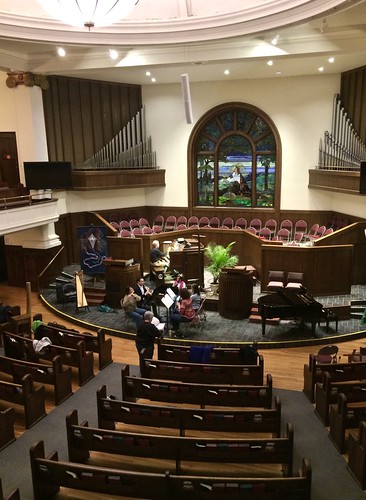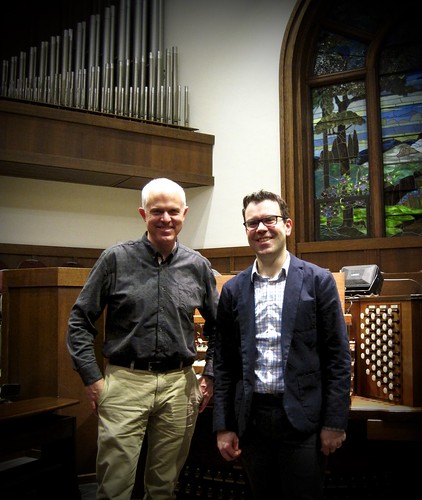Traveling Mercies
Posted on May 2, 2018 by Jason

Traveling Mercies, written by Manitou Winds founder Jason McKinney, was completed in January 2018. Composing the work became both an adventure and a learning process.
To tell you more, here’s Jason in his own words:
The idea to write a chamber work for organ first came to me in May 2017 as I sat at Central United Methodist Church, Traverse City, listening to a spectacular organ recital by Bradley Hunter Welch. The organ was not a favorite instrument of mine. I 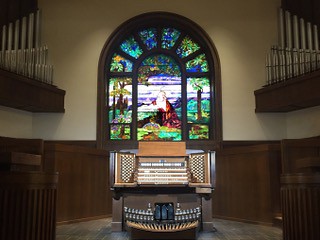 had tremendous respect for it (and for organists!), but I had never had a chance to fully understand or experience the instrument.
had tremendous respect for it (and for organists!), but I had never had a chance to fully understand or experience the instrument.
During the recital, as we were given a tour of the newly renovated organ, I began to connect to the sound. The whole building became an instrument, and we were sitting inside it! I physically felt the raw power of chords, dissonances crashing into consonance, the dynamic contrast from roar to purr. I was amazed how an organist combines timbres as though an entire orchestra were crammed into a single console. Wind players have to come up for air, string players have to reverse their bows, percussionists have to re-strike or keep rolling. But the organ is like a singing mountain, inhaling as it exhales, sending its sound wafting over us like a mist through a forest or cascading down on us like a waterfall. 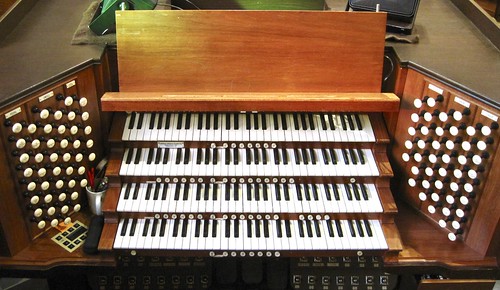
The recital had a profound effect on me, musically. It was months before I told anyone, but I left knowing I would write a work for organ someday. Still, there were hurdles to face. For starters, I’d taken it upon myself to write a piece featuring an instrument I’d neither written for nor played before. Frankly, the instrument scares me. Hundreds and hundreds of pipes — some of them quite a bit taller than me!
Before I hoped to compose anything, I had to learn more about this singing mountain. Fortunately, I had the best organ Sherpa anyone could ask for: Thomas Bara! He loaned me reams of organ music and a copy of his album. He 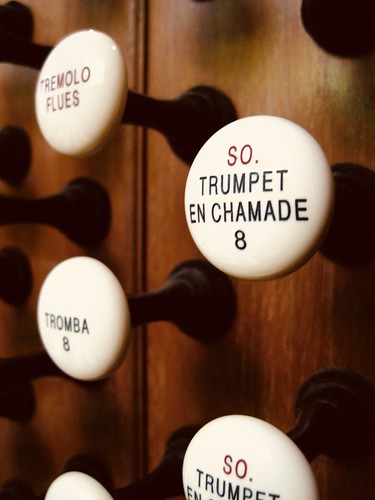 performed a personalized organ demonstration, explaining how various musical elements are performed and how all its manuals and stops come into play to create a unified sound. I also learned to speak its language — thumbing a glossary of strange words, discovering what the organ can and cannot do. As I pored over pages of organ repertoire, I realized I needed to understand what the individual organist brings to the music (yet more questions for Mr. Bara!).
performed a personalized organ demonstration, explaining how various musical elements are performed and how all its manuals and stops come into play to create a unified sound. I also learned to speak its language — thumbing a glossary of strange words, discovering what the organ can and cannot do. As I pored over pages of organ repertoire, I realized I needed to understand what the individual organist brings to the music (yet more questions for Mr. Bara!).
The next hurdle was facing the blank page. My last original work was written in 2006 — more than a decade ago! When Manitou Winds came into being in 2014, I delved into my archives to dust off some of my older works, fashioning them into something better than the original. But it had been a long time since I’d faced a truly blank page.
I decided on a gradual approach by first facing smaller blank pages. I sketched musical ideas as they came to me, intuitively. Instead of forcing them into a specific context or direction, I let my mind wander, paying more attention to colors and textures. Once I’d 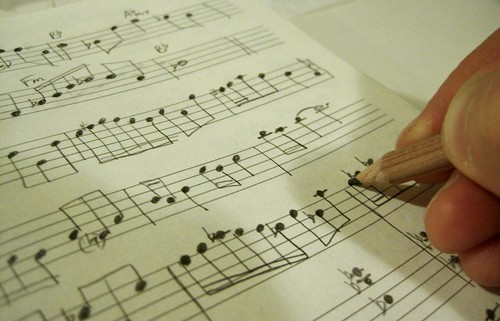 amassed several ideas, I sat down at my piano to play through them, gradually adding harmonies but allowing even those to change whenever I felt them shifting.
amassed several ideas, I sat down at my piano to play through them, gradually adding harmonies but allowing even those to change whenever I felt them shifting.
Working in this freer style put my imagination into overdrive. Soon, a story about a long journey and a search for deeper meaning began to build itself into the piece taking shape. Before I knew it, I’d reached the final hurdle: sitting at the computer to orchestrate the piece for the entire ensemble (the big blank page)! By this point, I was now more eager than afraid.
The task was akin to inviting friends to a party. Composing and arranging for Manitou Winds, I’ve learned not only the 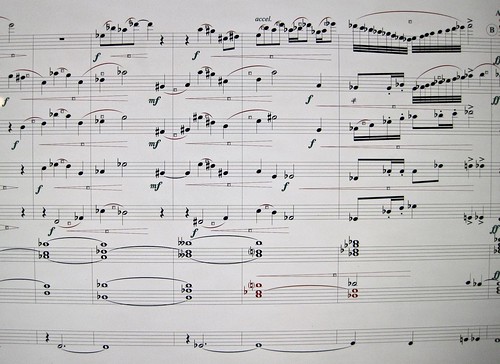 unique qualities each instrument brings to the music, but also each musician’s boundaries. We do occasionally surprise one another, but I’ve come to know by heart what they love to play, what will challenge them, what they will begrudgingly play, and what they cannot play.
unique qualities each instrument brings to the music, but also each musician’s boundaries. We do occasionally surprise one another, but I’ve come to know by heart what they love to play, what will challenge them, what they will begrudgingly play, and what they cannot play.
While orchestrating, I listened for each part to ring out. Whenever I couldn’t hear an instrument’s distinctive voice, I knew I was likely on the wrong track. I also made certain the organ was an equal part of the ensemble — neither a domineering presence nor merely accompaniment. I wanted it to seem as though Thomas was sitting in a chair next to us, taking part in the conversation rather than far away at a giant console.
Once finished, I realized this is a tone poem about wanderlust. Hearing the call of adventure, our narrator seeks excitement and wisdom from faraway places, dismissing the concerns and well-meaning advice of loved ones. Life abroad proves to be inspiring and overwhelming, leading our narrator on an introspective journey to find himself. Eventually, the wanderer returns home to find he is forever changed.
The title, Traveling Mercies, came to me while I was still sketching in my notebook. The title has a double meaning: 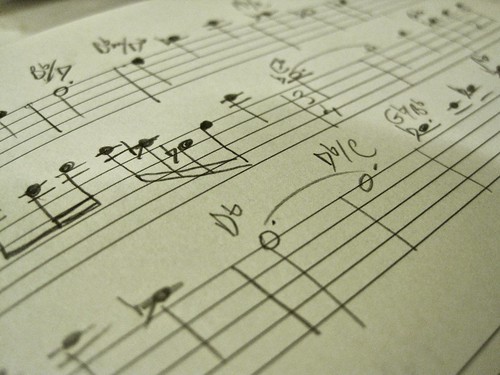 it evokes the special blessing travelers request as protection before embarking on a long journey, and it reminds me of a line from my favorite psalm, “Surely goodness and mercy shall follow me all the days of my life” (Psalm 23:6). I’ve always taken comfort in the notion that mercy can be a traveling companion — following us if we allow it.
it evokes the special blessing travelers request as protection before embarking on a long journey, and it reminds me of a line from my favorite psalm, “Surely goodness and mercy shall follow me all the days of my life” (Psalm 23:6). I’ve always taken comfort in the notion that mercy can be a traveling companion — following us if we allow it.
Rehearsing the new work has been tremendous fun for me. Hearing my friends learn their parts, gathering precision, weaving all the lines together… it’s not unlike watching loved ones open gifts and seeing their unfiltered reaction to what’s hidden beneath the wrappings. After weeks of rehearsing apart, finally getting to add Thomas and the organ to the full ensemble was simply magical.
Without Thomas Bara and the members of Manitou Winds, this piece would never have been written, and so I’ve dedicated the work to them. I hope you’ll join us for the premiere.
Category: Performances, Sojourn of SpringTags: bassoon, Bradley Hunter Welch, Central United Methodist Church, Chamber Music, clarinet, composition, concert, featured autumn, featured spring, flute, horn, Jason McKinney, manitou winds, Michigan, oboe, organ, organ music, performance, Sojourn of Spring, spring concert, Thomas Bara, Traveling Mercies, Traverse City, wind quintet, woodwind quintet, world premiere


